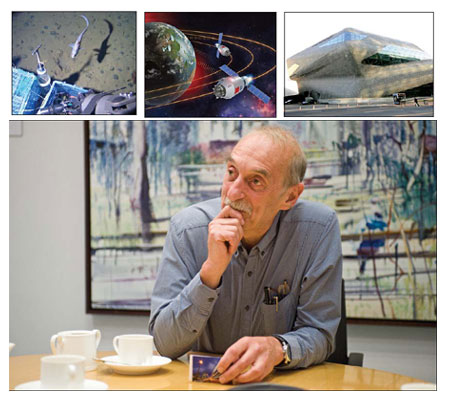Lasting legacy
Updated: 2011-12-30 08:51
By Andrew Moody (China Daily)
|
||||||||
|
From left: A photo taken by the submersible Jiaolong from 5,000 meters underwater; China's first space lab module Tiangong-1 entered into long-term operation management; The 1,800 seating capacity Guangzhou Opera House. [Photos Provided to China DailyNick J B Moore / for China Daily] |
China is also setting up in competition against Airbus and Boeing with its C919 airliner being built by the Commercial Aircraft Corporation of China and which is set to take to the skies in 2014.
The country also wants to make its mark in space and plans to have its first manned space station orbiting the earth by 2020.
It is not just the heights of space but the depths of the ocean that China wants to explore.
The Jiaolong, which is named after the mythical Chinese sea dragon, is expected to dive to 7,000 meters beneath the ocean surface some time over the next 12 months.
China has also made major breakthroughs in the field of supercomputers, developing the world's most advanced machine - the Tianhe-1A - capable of doing 2.5 thousand trillion calculations a second.
Ian Morris, professor of history and fellow of the Archaeology Center at Stanford University in California and author of Why the West Rules - For Now, which features in The New York Times' list of the 100 most notable books of the year, says many major societies throughout history have wanted to make major statements of themselves.
"One of the most famous examples was in ancient Athens. There were big debates at that time as to whether to build the Parthenon and the temples on the Acropolis," he says.
"One of the arguments that swayed the issue was the lack of anything impressive in Sparta (the rival Greek state). It was felt that if it fell to the ground nobody would be impressed by the ruins because there would be nothing there. They wanted to build something that people in many ages to come would understand and think what an incredible place it must have been."
One of the major issues about large-scale projects and infrastructure is that they are a fragile driver of economic development.
China's fast economic growth over the past 15 years has largely been fueled by exports and by investment in big projects such as the construction of roads, airports and other facilities.
The government itself recognizes this and that is why there is so much emphasis on boosting domestic consumption in the current 12th Five-Year Plan (2011-2015).
The national auditor's report earlier this year highlighting local government debt was seen as a warning light for some that there needed to be more restraint.
George Magnus, senior economic adviser at Swiss bank UBS, is one who has warned about China's debt in his book, Uprising: Will Emerging Markets Shape or Shake the World Economy?
He argued that China's internal borrowing would eventually put a severe brake on its growth since the projects would not generate the returns to pay back the loans.
"There was an example I cited in my book, somewhat tongue in cheek, about some place way out in the west (of China) where they were building a huge tower with a revolving restaurant despite the population within a 50 mile radius being relatively small. When you look at constructions like this it doesn't make a lot of sense," he says.
But he insists he is not as negative as some such as the US hedge fund investor Jim Chanos, the founder of Kynikos Associates, who has argued China does not have the money for this over-investment.
"As an economist, you can be critical of the expenditure on and financing of these kind of projects. But from a human point of view, you think, 'Yes, why not?' It is just a natural thing for people to show off their prowess and prosperity," he says.
Jacques believes the Beijing Olympics in 2008 demonstrated this prowess and imprinted a new image of China on people's consciousness across the world.
"I think the Bird's Nest (the Games' main stadium) is one of the most iconic buildings in the world. It is beautiful. I love it and I seem to pass by it on every trip I make to Beijing," he says.












